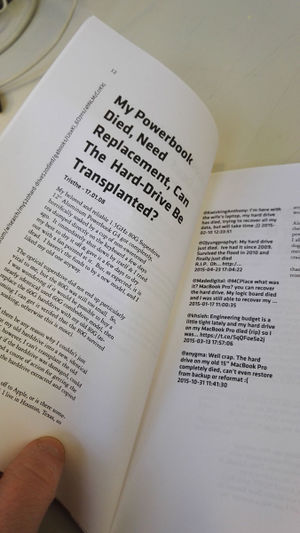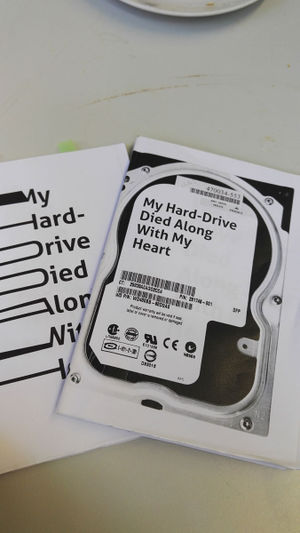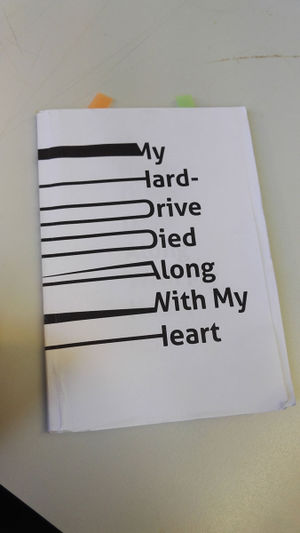User:ThomasW/MyHard-DriveDied Production: Difference between revisions
(Created page with "Photobook Early tech startups sites Search Engiences sites Social Media sites Web hosting sites News sites Compare Facebook - MySpace Google - Yahoo My HD Died Book Launc...") |
No edit summary |
||
| (One intermediate revision by the same user not shown) | |||
| Line 1: | Line 1: | ||
===About=== | |||
As a society we always seem to be looking for a new technical solution for knowledge and information storage and for this, we hope there is one magic, final solution, one that will solve every issue. | |||
But easy solutions, creates there own problems, the perceived view on the stable nature of digital information differ from reality. Problems like old physical formats, lost or non functional machine’s, company’s that go bankrupt or file formats with no support in the future and changing user license, there are many points of failure., it seems that the more technical things gets, the more problems it creates. | |||
Today the main format for storing digital information is hard-drives, from your personal laptop to the big server farms. We put a lot of trust in this devise, but what is the impact when they fail? | |||
This book is part of my graduation project at the The Piet Zwart Institute in Rotterdam. The | |||
book containing over XXX different forum posts and xxxx tweets from social media on the subject of data loss, from the perspective of people wrinting and posting online on the subject and them dealing with the aftermath the death or failure of their hard-drives. | |||
The name of the project comes from a tweet made by @KatShambaugh @My hard drive died along with my heart #help” | |||
[[File:Myhddied001.jpg|300px]] | |||
[[File:Myhddied002.jpg|300px]] | |||
[[File:Myhddied003.jpg|300px]] | |||
[[File:Myhddied004.jpg|300px]] | |||
Latest revision as of 15:06, 3 May 2016
About
As a society we always seem to be looking for a new technical solution for knowledge and information storage and for this, we hope there is one magic, final solution, one that will solve every issue.
But easy solutions, creates there own problems, the perceived view on the stable nature of digital information differ from reality. Problems like old physical formats, lost or non functional machine’s, company’s that go bankrupt or file formats with no support in the future and changing user license, there are many points of failure., it seems that the more technical things gets, the more problems it creates.
Today the main format for storing digital information is hard-drives, from your personal laptop to the big server farms. We put a lot of trust in this devise, but what is the impact when they fail?
This book is part of my graduation project at the The Piet Zwart Institute in Rotterdam. The book containing over XXX different forum posts and xxxx tweets from social media on the subject of data loss, from the perspective of people wrinting and posting online on the subject and them dealing with the aftermath the death or failure of their hard-drives.
The name of the project comes from a tweet made by @KatShambaugh @My hard drive died along with my heart #help”
My HD Died Book Launch
Book Black and White 120+ pages Glue Binding A5
Print special copy for event 50+ 250 euros
Print and publish at LULU Get ISBN number
Keywords?
5 Stages of grief
1. Hi blog 2. What happened 3.Angre/frustation 4.Depression 5.Acceptance Denial Anger Bargaining Depression Acceptance
0. Denial— The first reaction is denial. In this stage individuals believe the diagnosis is somehow mistaken, and cling to a false, preferable reality. 1. Anger — When the individual recognizes that denial cannot continue, they become frustrated, especially at proximate individuals. Certain psychological responses of a person undergoing this phase would be: "Why me? It's not fair!"; "How can this happen to me?"; '"Who is to blame?"; "Why would this happen?". 2. Bargaining — The third stage involves the hope that the individual can avoid a cause of grief. Usually, the negotiation for an extended life is made in exchange for a reformed lifestyle. People facing less serious trauma can bargain or seek compromise. 3. — "I'm so sad, why bother with anything?"; "I'm going to die soon, so what's the point?"; "I miss my loved one, why go on?" During the fourth stage, the individual becomes saddened by the mathematical probability of death. In this state, the individual may become silent, refuse visitors and spend much of the time mournful and sullen. 4. Acceptance — "It's going to be okay."; "I can't fight it, I may as well prepare for it." In this last stage, individuals embrace mortality or inevitable future, or that of a loved one, or other tragic event. People dying may precede the survivors in this state, which typically comes with a calm, retrospective view for the individual, and a stable condition of emotions.
Loss of data Failed trust in technologies
Evening
Reading from the book
Video as intro
Sharing Stories
Interview?
Psychiatrists: Topic of the loss of memory’s and its impact, 5 Stages of grief Media Theorise: Topic of hardware, formats Individual: Someone that have lost their data Archivists; How institution deal with data
?===References?===
http://linkeditions.tumblr.com/roth
cory_arcangel. Writing my Novel http://shop.arcangelsurfware.biz/collections/new-arrivals/products/working-on-my-novel Found footages / images publication Rick Prelinger http://www.imdb.com/title/tt0469153/?ref_=nm_flmg_dr_2




